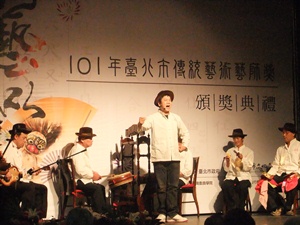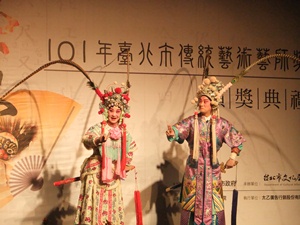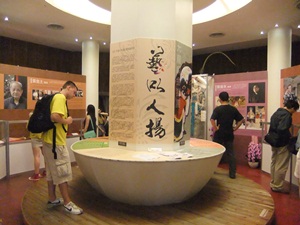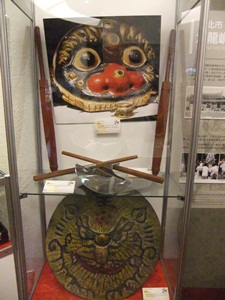Masters of traditional arts rewarded for time-forged skills
By Psyche Cho The award, launched by the Taipei City Government in 2010, is given to pay homage to masters who achieve greatness in diverse trades, demonstrating their contribution and helping to meet the general public's concern over the preservation of traditional arts, said Taipei Mayor Hau Lung-pin during the ceremony. "A city that doesn't value its history and culture holds no bright future," said Hau, going on to say that "these masters have contributed greatly in making the name of Taiwan known to the world." The third edition of the award honored masters Tai Chi-hsia, a 94-year-old Beijing Opera performer; Tsao Fu-yung, who brings Beijing Opera into the modern age; Chu Ching-song, the famed Beiguan musician and Taiwan puppet theatre musician/singer; Chang Chin-tu, Beiguan drum player; and Dalongtong Golden Lion Dance Troupe, the ancestor of lion dance groups in Northern Taiwan. Seeing the glamorous concubine Yang Kuifei bending backwards drunkenly with a wine cup held in her mouth, astonished audiences may forget the graceful performer Tai Chi-hsia (aka Tai Chih-lan) was 94 years old when she took on the role in Drunken Concubine. This exquisite and masterful skill was forged via strenuous training starting at the age of 7. Born into a Beijing Opera family in 1918, Tai mastered robust techniques in playing various roles for both male and female, through a long and arduous apprenticeship. Now a household name in Beijing Opera circles, master Tai has devoted her entire life to teaching and passing on her knowledge of the art to future generations. Her passion for the traditional Chinese art has inspired her to constantly break her own records. In 1990, Tai went on stage to perform a repertoire from "Yin Yang River" in which she impressed the audiences with qiaogong (a type of footwork on stilts in Beijing Opera), inciting gasps of awe from the crowd. With heartfelt love and infatuation for Beijing Opera, Tai set a new record at the age of 90 by taking part in the opera "Lady General Mu Takes Command," a feat most people considered impossible. However, she indeed proved that it was possible, and now people are starting to believe that Tai's perseverance will enable her to transcend the age barrier again in the future. The spirit Tai demonstrates through her actions has made herself a great teacher and a role model for future generations. Beijing Opera being modernized in Taiwan Master Tsao is a "first-generation" Beijing Opera successor who received professional training in Taiwan. He has experimented with Beijing Opera to create "Chinese Opera", in which he takes the part as premier xiaosheng, the young male role, in various settings. Before enjoying the reputation as the ageless xiaosheng, Tsao underwent a diligent forging of his skills. A turning point in his acting career was the role of Lü Bu, dominating and confident, yet sentimental to perfection in The Hero and the Beauty. He toured the US for 300-pluss performances in one year in 1962. Tsao reflects and says that performance enabled profound understanding of unifying details and mindset changes in Beijing Opera. The experience, according to Tsao, is a starting point that allowed him to transcend himself and establish his artistic achievements. Despite highs and lows over the course of master Tsao's career, he always strove to improve on his craft via continued practice, which is what he expects from his students. Beiguan musician and puppet master The troupe was established during the Qing Dynasty and based in Dadaocheng, with a history over 200 years. It has gradually assumed leadership among the numerous parade groups formed in Taiwan since the 1950s. Its long history has helped to cultivate a number of respected masters. Master Chu Ching-song, the famed Beiguan musician and Taiwan puppet theatre musician/singer, is one of them. Born in 1929, Chu joined the troupe at the age of 16, focusing his studies on how to perform on stage. Later Chu extended his career to another theatrical genre—hand puppetry, by joining the Laughter Hand Puppet Theater when he was 20. Master Chu started out as the assistant string and wind instrumentalist and took the singing part as well. That signaled Chu's embarkation on a career spanning more than sixty years as the lead backstage singer and musician in Taiwan puppet shows. His strong singing voice and complex tonal changes have become his trademark. Later Chu completed a full rotation of the posts in Taiwan's major hand puppet troupes. He joined the I Wan Jan Puppet Theater at 26 and left for Hsiao Hsi Yuan Puppet Theater at 38. Though already in his 80s, master Chu says he will continue to teach and pass on his knowledge to newcomers, with the hope of revitalizing Beiguan music and traditional opera. Drum up Beiguan music Another focal point in Kung Le Hsuan is master Chang Chin-tu, who plays drums in the troupe. Grown up in a family that members had been disciples of Kung Le Hsuan for three generations, master Chang followed the step of his father, a famous Taiwan puppet theater backstage musician, into the music career. Master Chang's father used numbered musical notations to teach him the most commonly-used Suona tunes in Taiwan puppet theatre. He was also trained in techniques and strength to be able to stroke drum willfully. Chang's career approach was much like Chu's. At the age of 14, Chang joined the I Wan Jan Puppet Theater to play the cymbals, signaling the start of his inseparable link with Taiwan puppet theatre throughout his life. In 1968, Chang joined the Hsiao Hsi Yuan Puppet Theater and has stayed with the group ever since as the percussion leader. Beiguan musical clubs now face a lack of new blood, Chang constantly encourages professional musicians to aspire for new heights, which might be a way to ensure the survival of this genre of music. Lion dance still safeguards the land 200 years later Their history of over 200 years makes the troupe the earliest lion dance group in Taiwan and the ancestor of lion dance groups in Northern Taiwan. This can also can seen in Dalongtong Golden Lion Dance Troupe's leading position in temple fairs. Beyond its long history, the troupe bears its trademark of "High Head Lion" dances, referring to the pride of the lion that never lowers its head before anyone no matter how it moves or jumps around. Certified as a Taipei City Traditional Arts Preservation Group in 2011 by the Taipei City government, the troupe expects to continually promote and pass on the techniques of lion dances and martial art skills in the future to ensure the sustainable heritage of traditional lion dances.
Staff Reporter After Embarking humbly on their careers, four veterans and one lion dance troupe ended up honored for their accomplishments, receiving the Taipei Master of Traditional Arts Award May 26 after decades of ceaseless refinement of their skills.
After Embarking humbly on their careers, four veterans and one lion dance troupe ended up honored for their accomplishments, receiving the Taipei Master of Traditional Arts Award May 26 after decades of ceaseless refinement of their skills.  Queen of Beijing Opera
Queen of Beijing Opera Another figure who plays a decisive role in the development of Beijing Opera in Taiwan is Tsao Fu-yung (aka Tsao Yung-Sheng), in particular, the modernization of the traditional art.
Another figure who plays a decisive role in the development of Beijing Opera in Taiwan is Tsao Fu-yung (aka Tsao Yung-Sheng), in particular, the modernization of the traditional art.  Beiguan musical troupes are an essential part in temple ceremonies as their bustling style fits the celebrative atmosphere on occasions such as birthdays of deities around Taiwan each year. In Taipei, Kung Le Hsuan (共樂軒) is one of great significance.
Beiguan musical troupes are an essential part in temple ceremonies as their bustling style fits the celebrative atmosphere on occasions such as birthdays of deities around Taiwan each year. In Taipei, Kung Le Hsuan (共樂軒) is one of great significance.  Founded in the Qing Dynasty, the Dalongtong Golden Lion Dance Troupe was a mixture of safeguarding force and dance troupe as well. Local militia cleverly infused martial art skills with the lion dance performance.
Founded in the Qing Dynasty, the Dalongtong Golden Lion Dance Troupe was a mixture of safeguarding force and dance troupe as well. Local militia cleverly infused martial art skills with the lion dance performance.

![Taiwan.gov.tw [ open a new window]](/images/egov.png)
